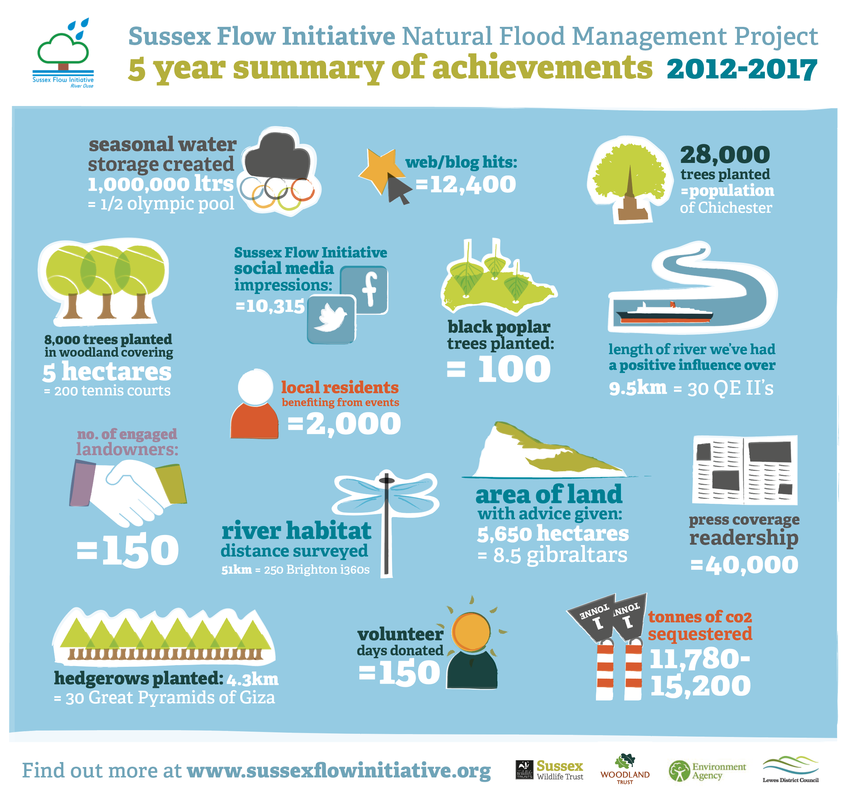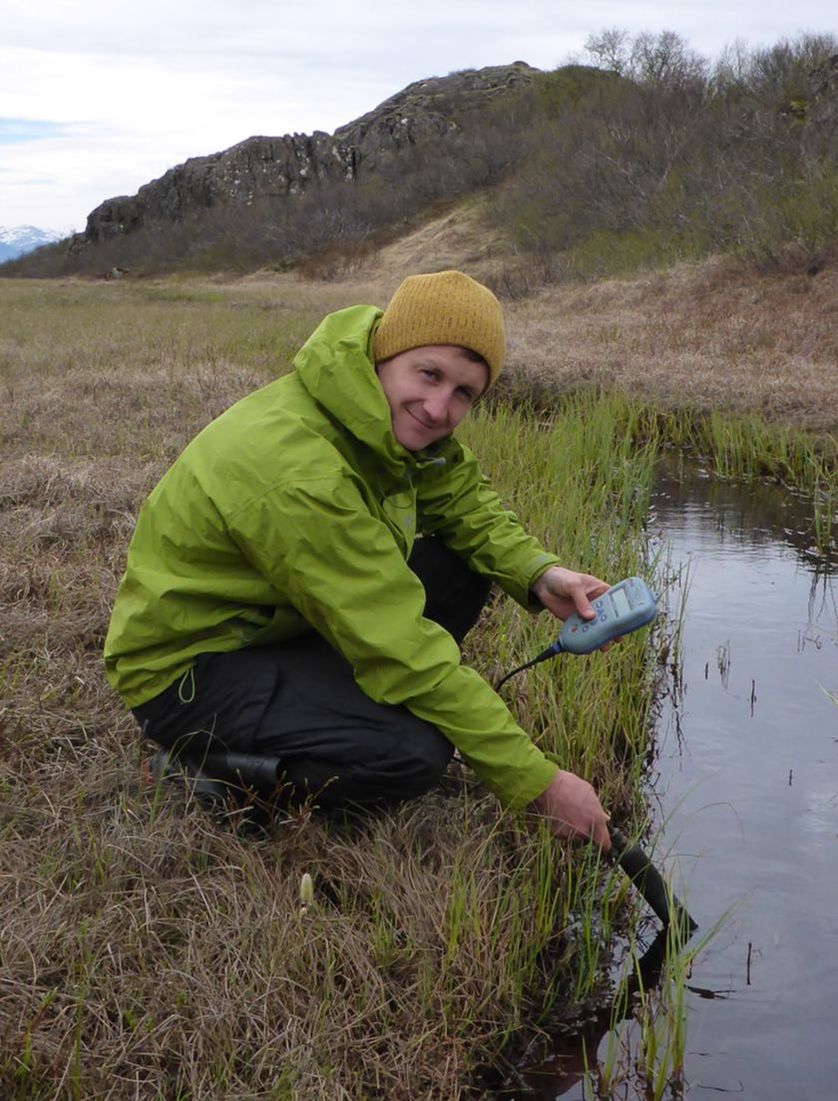|
The Sussex Flow Initiative has achieved a huge amount since it began 5 years ago, working with local communities, councils and organisations to investigate the potential for natural flood management, and to naturally reduce flood risk across the County and beyond. In 2012, the Sussex Wildlife Trust, Environment Agency and the Woodland Trust began an innovative project in the River Ouse catchment in Sussex - the Sussex Flow Initiative (SFI). The project’s role was to investigate opportunities for Natural Flood Management (NFM) at the catchment scale, and to implement a range of different techniques to naturally reduce flood risk whilst providing multiple benefits to society and the environment.
In its first 5 years, we advised 150 landowners on over 5,650 hectares of land, planting nearly 28,000 trees and creating over 1,000,000 litres of new seasonal water storage by constructing flood storage ponds, pocket ponds and other Run-off Attenuation Features. Working with the Ouse & Adur Rivers Trust we helped to map nearly 5,000 ha of the catchment, and have facilitated River Habitat Surveys along 51 km of main rivers, resulting in detailed sub-catchment plans that will help target our future work. The project is not only helping to reduce flood risk for communities downstream, it is also contributing to vital wildlife networks, and is enhancing a variety of ecosystem services, such as water purification, aquifer recharge, and climate regulation. We estimate that we have helped to store at least 10,000 tonnes of CO² in 5 years. By disseminating information on NFM in the form of published guidance and handbooks, the SFI website and social media, as well as newspaper articles and features on local radio, the project has had far-reaching influence, as well as helping to support others to use an NFM approach. Over the last 5 years, SFI has developed strong partnerships and collaborations with organisations and academic institutes throughout the UK, supporting the development of computer models and NFM targeting tools, and research into the design and influence of large woody debris on flow and geomorphology. One of the (not so) secrets of success of SFI, and NFM more generally, is the willingness of local communities to take ownership of tackling flood risk, either by carrying out work on their land or volunteering their time to help. We’ve been only too happy to help support these communities to feel empowered to do something tangible to help reduce flooding in their local area. We’ve also clocked up over 150 volunteer workdays, involving a range of activities from GIS mapping to tree planting. We are very grateful for all this support - the project couldn’t have come this far without its volunteers. Through working closely with local landowners, communities, councils and organisations, the SFI project has been a huge success and continues to deliver advice and practical implementation of NFM throughout Sussex. SFI has had a busy five years (full 5-year report available here) and with national interest in NFM growing, we have even more ambitious plans for the next five years. So keep your eyes out for our 5-year vision, and for our contribution to natural flood management over the next few years, as well as a national programme of natural flood management supported through the Environment Agency’s Working with Natural Processes Project!
1 Comment
Environment Agency publishes report on Natural Flood Management evidence baseFor a while now, local projects have been making our landscapes more flood resilient at a local level, and showing that working with natural processes really can help to reduce flooding. Until now however, there has been no national platform bringing us all together to share and embed Natural Flood Management as a national discipline. On the 31st of October at the CIWEM conference, the Environment Agency launched their much anticipated ‘Working with Natural Processes’ (WwNP) report, which brings together all our evidence and expertise into one easily accessible national resource. The WwNP documents are an invaluable resource for flood risk managers and those advocating and implementing Natural Flood Management (NFM). The reports provide an in-depth review of the existing evidence for NFM; providing summaries of the main types of NFM; key literature; the level of confidence in each NFM approach, and identifying the gaps in our knowledge. The report is accompanied by interactive maps for targeting NFM and an extensive selection (65!) of case studies throughout the country. The good news is that an analysis of vast wealth of existing research reveals that NFM can definitely help to reduce flood risk, particularly for smaller magnitude floods in small to medium sized catchments. The report also shows that NFM provides multiple additional benefits both to the environment (e.g. habitat creation, water quality improvements, climate regulation), and to society, through reduced flood risk, increased access to green space, creating a healthier environment etc. Importantly, the knowledge gaps that were identified, such as how NFM can mitigate extreme flood events or how it can provide climate change resilience, will shape future research projects, which will continue to feed into the evidence base for NFM. In fact, the Environment Agency and the Natural Environment Research Council have put together a £3.4m research call to fund projects that contribute to further understanding of NFM. One of the key areas where further evidence is needed is the use of NFM in lowland catchments, which the SFI project is helping to provide. The report offers a range of “Top tips” for utilising NFM, all of which are at the core of the work that we do at the Sussex Flow Initiative :-
We already work closely in partnership with the Environment Agency on the SFI project, but we look forward to working with them more closely to embed NFM in all Flood Risk Management projects and strategies.
The full report and accompanying resources can be accessed here Welcome to Matt Turley, the new Project Officer for the Sussex Flow Initiative!We are pleased to welcome Matt as our new Project Officer for SFI. He will be continuing our work in the Ouse catchment to reduce flood risk using Natural Flood Management (NFM). He brings a wealth of enthusiasm and skills to the position, including research expertise in freshwater ecology, hydrology, and geomorphology, an understanding and appreciation of the multiple benefits of Natural Flood Management, as well as lots of practical skills that will ensure Sussex Flow Initiative (SFI) can meet their ambitious targets for 2017/18 and beyond!
We’ve got lots of plans and ideas for NFM within the Ouse catchment, so if you would like to discuss the potential for NFM on your land, you have any questions about NFM, or if you’d like to get involved as a volunteer, please get in touch with us at [email protected]
|



 RSS Feed
RSS Feed
